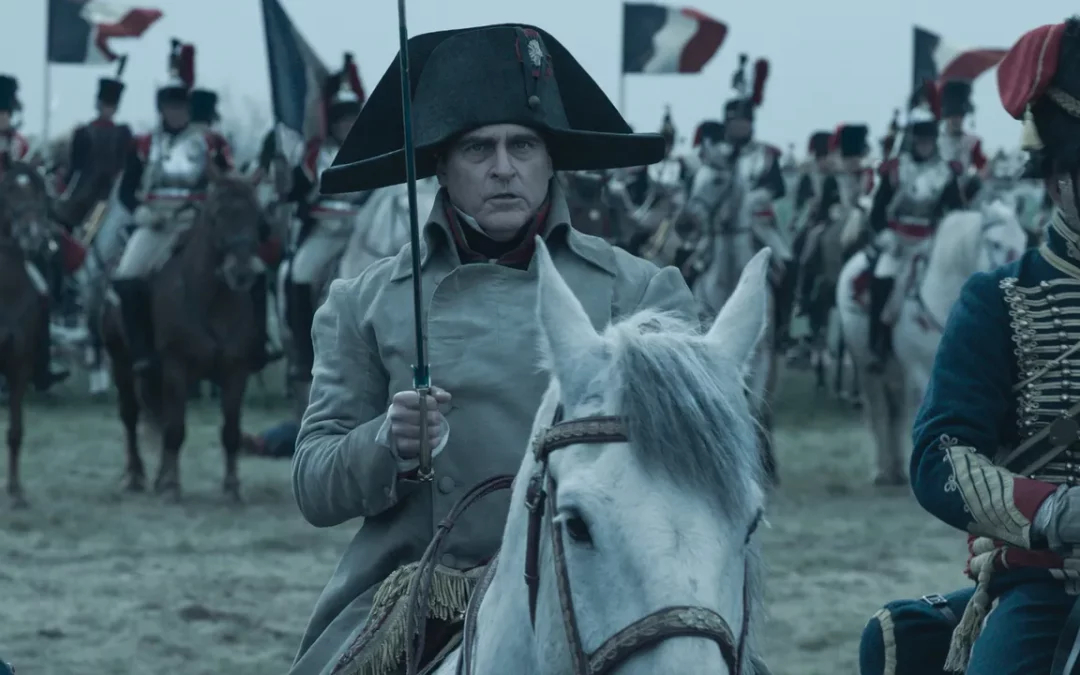“Napoleon” – 2 1/2 stars out of 4
Ridley Scott’s “Napoleon” traces the life of the iconic French emperor from the time of the
French Revolution through his final exile after his defeat at the Battle of Waterloo. His rise and
fall as a military leader is paired against his tumultuous relationship with his wife Josephine,
and though Scott’s film features powerful moments, as an epic document of such a legendary
historical figure, “Napoleon” feels underwhelming.
Scott ushers us into the late 18 th Century, as the chaos of the French Revolution is just about to
deliver the French queen to the guillotine. As the executioner holds the head of Marie
Antoinette to the crowd, we meet a young Napoleon Bonaparte (Joaquin Phoenix) in the crowd
(historical spoiler: he wasn’t there in real life). He’s far from the Napoleon that history will
come to know, but after leading a successful battle in which he narrowly avoids death by
cannonball (his horse is not so lucky), a promotion puts him on the fast track to power.
“Napoleon” walks us through this ascension, but in the wake of the revolution it’s a little hard
to follow exactly how Bonaparte is rising through the ranks. It’s easier to understand what is
going on in his personal life, as he meets a woman of questionable reputation, and becomes
transfixed by her. Before long, Napoleon and Josephine (Vanessa Kirby) are married, and his
quest for power is joined by the film’s complementary quest: to deliver Napoleon an heir.
Both quests prove challenging, and over its surprisingly conservative 2 ½ hour run time, Scott’s
film hits the expected notes as those at least loosely familiar with the titular character
recognize the triumphs and tragedies that follow. Unfortunately, while the film does provide
some memorable moments—the horrible conclusion of the Battle of Austerlitz being one
standout—“Napoleon” mostly plays out in a routine, “this, then this, then this” kind of narrative
style, bringing the story to the screen, but only in a straightforward, modestly engaging
manner.
As a side effect, the lack of a compelling plot leaves time to notice other oddities. Though the
film is centered on two French icons, Kirby employs a strictly British accent for her
performance, and Phoenix sticks to his native American accent. A fellow critic suggested that
getting the two actors to emote French accents might have been more distracting than helpful,
but the result is a pair of performances that feel stilted nonetheless. As far as characterizations
go, Bonaparte’s strange dysfunctional relationship with Josephine has a way of (intentionally?)
undercutting his character—cutting him down to size, if you excuse the pun—and by seeing
behind the curtain it’s a little hard to see Napoleon as the icon he came to be.
For me, the most interesting effect of “Napoleon” was to muse further on the contrast between
the French and American Revolutions, which were separated by barely more than a decade, yet
took dramatically different paths (could Washington have become an American Napoleon had
he not tempered his ambitions?). Granted, the circumstances were pretty different as well, but
after re-reading Dickens’ Tale of Two Cities last year, it was interesting to return to the Reign of
Terror.
As a film, though, “Napoleon” won’t stick in my memory much beyond the end of 2023. It’s far
from a bad film, more a missed opportunity. A movie that checks the boxes, but lacks the flair
its subject probably deserves.
“Napoleon” is rated R for wartime violence, profanity, and sexual content, including some
fleeting nudity.

